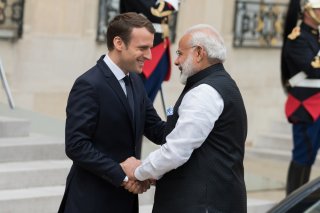Understanding the Franco-Indian Relationship
Among Western countries, France has often been the first to illustrate a mature understanding of India’s position on varied issues ranging from nuclear tests to the ongoing Russia-Ukraine War.
French President Emmanuel Macron has accepted the invitation to be the chief guest at India’s Republic Day celebrations on January 26, 2024. It would be the sixth time a French President has been accorded the honor of attending the grand parade in New Delhi. In some ways, the invitation was an act of reciprocity. Indian Prime Minister Narendra Modi was the guest of honor at the Bastille Day Parade in Paris in July, where he witnessed a fly-by of the Indian Air Force’s Rafale Jets. Moreover, the French president’s visit to New Delhi in January 2024 may also expedite negotiations over India’s procurement of Scorpene submarines and Rafale fighter jets for its aircraft carriers.
While India has significantly strengthened its ties with major European countries over the past few years, the France-India time-tested partnership stands out. The close bilateral relations between Paris and New Delhi represent contemporary major power relations and serve as a practical model for East-West cooperation based on mutual respect, a common understanding of individual sensitivities, and a shared vision amid the evolving international geopolitical landscape.
Among Western countries, France has often been the first to illustrate a mature understanding of India’s position on varied issues ranging from the nuclear tests during the second half of the twentieth century to the ongoing Russia-Ukraine War. France has also consistently contributed to building India’s defense capacity. From 2017 to 2021, France became India’s second-largest defense supplier. Moreover, while Western nations have generally been reluctant to transfer advanced defense technology to the South Asian country, France and India are set to jointly design, develop, and manufacture a combat aircraft engine and an engine that will power India’s advanced multi-role helicopter.
Another critical dimension of this bilateral partnership is France’s attitude toward India’s internal affairs. Unlike the general notoriety surrounding sermons and interventions of Western powers on the domestic affairs of non-Western countries, Paris has shown a great understanding of India’s national sensitivities and concerns. For instance, the French Foreign Ministry did not criticize India when it abrogated Article 370 of its constitution regarding the autonomy of Jammu and Kashmir (J&K). In addition, France also supported India’s position on J&K at a closed-door United Nations Security Council (UNSC) meeting spearheaded by China in 2019. Moreover, Paris has shared New Delhi’s concern towards cross-border terrorism, which was illustrated through France’s support of a UNSC resolution on terrorist Masood Azhar and its push for more potent Financial Action Task Force (FATF) sanctions on Pakistan.
Another crucial area of convergence is the shared geopolitical visions both countries possess. While France is deeply integrated within the Western alliance and institutional networks such as the North Atlantic Treaty Organisation (NATO) and the European Union (EU), Paris has often sought to operationalize a “third-way” strategy that banks on a foreign policy driven by political autonomy rather than bloc politics. This was evident in France’s 2018 Indo-Pacific strategy, which called for an inclusive Indo-Pacific and emphasized how foreign relations should not be determined by binary power competitions but by practical engagements with partners that share common interests and concerns. New Delhi has greatly welcomed France’s position given the former’s strategic autonomy-motivated foreign policy.
As India seeks to attain great power status in Asia, with the world’s fifth largest economy, the second largest standing army, and the largest population, it has consistently highlighted that national interest will always shape its external engagements. Thus, this congruence of political visions adds more heft to the strategic partnership between France and India, allowing both countries to collaborate on international projects such as the International Solar Alliance and forge trilateral frameworks with other regional powers such as the United Arab Emirates and Australia.
However, despite the growth of the Paris-New Delhi partnership, France still needs to overcome certain limitations in Indo-Pacific geopolitics. Although a resident Indo-Pacific power, France’s capacity to expand its diplomatic impact in the region still trails the United States, China, Japan, and South Korea. Paris faces constraints in providing large-scale infrastructure financing and effectively penetrating the defense market of regional countries. However, such challenges also serve as notable opportunities for France and India to expand the scope of their deepening ties in the region. Just as India has helped and supported France’s membership in key Indian Ocean multilateral institutions such as the Indian Ocean Rim Association (IORA), India can also serve as a bridge for Paris to engage with other Indo-Pacific countries at a time when New Delhi has been making notable strides in enhancing its role as a trusted security partner in the Western Pacific.
Additionally, while the bulk of the bilateral partnership centers on defense cooperation, it must also focus on economic and commercial ties. This is especially true given that the realms of security and commerce are increasingly interlinked. Accordingly, India’s trade with France lags significantly behind bilateral exchanges with other European countries like Germany and the Netherlands. Moreover, French companies and businesses are less established in India than in other European countries.
Nevertheless, despite certain limitations and the geopolitical uncertainty that continues to cloud the international security architecture, the France-India special relationship will likely remain intact. Consequently, while the complex global political-economic landscape introduces several challenges, it creates new opportunities for Paris and New Delhi to maximize the utility of their already robust partnership.
Don McLain Gill is a geopolitical analyst, author, and lecturer at the Department of International Studies, De La Salle University.
Image: Shutterstock.com.

